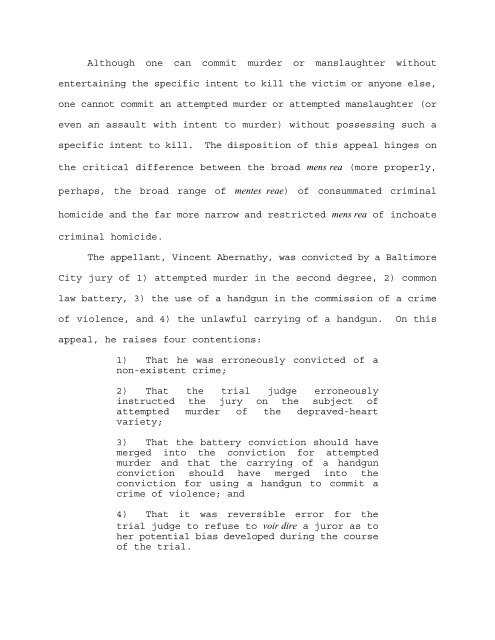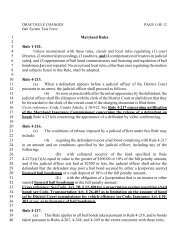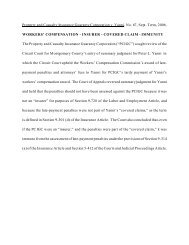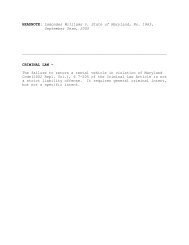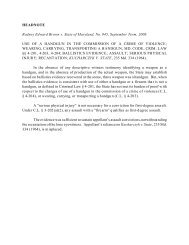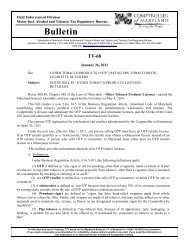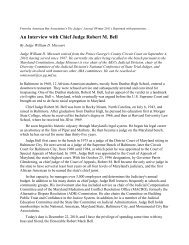Although one can commit murder or ... - Maryland Courts
Although one can commit murder or ... - Maryland Courts
Although one can commit murder or ... - Maryland Courts
You also want an ePaper? Increase the reach of your titles
YUMPU automatically turns print PDFs into web optimized ePapers that Google loves.
<strong>Although</strong> <strong>one</strong> <strong>can</strong> <strong>commit</strong> <strong>murder</strong> <strong>or</strong> manslaughter without<br />
entertaining the specific intent to kill the victim <strong>or</strong> any<strong>one</strong> else,<br />
<strong>one</strong> <strong>can</strong>not <strong>commit</strong> an attempted <strong>murder</strong> <strong>or</strong> attempted manslaughter (<strong>or</strong><br />
even an assault with intent to <strong>murder</strong>) without possessing such a<br />
specific intent to kill. The disposition of this appeal hinges on<br />
the critical difference between the broad mens rea (m<strong>or</strong>e properly,<br />
perhaps, the broad range of mentes reae) of consummated criminal<br />
homicide and the far m<strong>or</strong>e narrow and restricted mens rea of inchoate<br />
criminal homicide.<br />
The appellant, Vincent Abernathy, was convicted by a Baltim<strong>or</strong>e<br />
City jury of 1) attempted <strong>murder</strong> in the second degree, 2) common<br />
law battery, 3) the use of a handgun in the commission of a crime<br />
of violence, and 4) the unlawful carrying of a handgun. On this<br />
appeal, he raises four contentions:<br />
1) That he was err<strong>one</strong>ously convicted of a<br />
non-existent crime;<br />
2) That the trial judge err<strong>one</strong>ously<br />
instructed the jury on the subject of<br />
attempted <strong>murder</strong> of the depraved-heart<br />
variety;<br />
3) That the battery conviction should have<br />
merged into the conviction f<strong>or</strong> attempted<br />
<strong>murder</strong> and that the carrying of a handgun<br />
conviction should have merged into the<br />
conviction f<strong>or</strong> using a handgun to <strong>commit</strong> a<br />
crime of violence; and<br />
4) That it was reversible err<strong>or</strong> f<strong>or</strong> the<br />
trial judge to refuse to voir dire a jur<strong>or</strong> as to<br />
her potential bias developed during the course<br />
of the trial.
- 2 -<br />
M<strong>or</strong>e than a nutshell version of the facts is not necessary.<br />
As part of a senseless neighb<strong>or</strong>hood squabble at approximately 1:20<br />
P.M. on February 6, 1994, at the intersection of Milton Avenue and<br />
Biddle Street in East Baltim<strong>or</strong>e, the appellant pulled out a handgun<br />
and fired five <strong>or</strong> six rounds at a group of boys who had been<br />
harassing him and his friends.<br />
One of the bullets struck and<br />
injured Jacklyn Holiday, an innocent pedestrian who was standing<br />
with her young son at a nearby bus stop. The appellant was charged<br />
with the attempted <strong>murder</strong> of Jacklyn Holiday.<br />
In presenting its case, the State neither offered proof to<br />
show n<strong>or</strong> even argued that the appellant had harb<strong>or</strong>ed any specific<br />
intent to kill any<strong>one</strong>.<br />
At the close of the State's case, the<br />
Assistant State's Att<strong>or</strong>ney acknowledged to the court that the State<br />
was not "pressing f<strong>or</strong> attempted first-degree <strong>murder</strong>" because of the<br />
lack of any evidence of an intent to kill. Acc<strong>or</strong>dingly, the trial<br />
judge granted the appellant's motion f<strong>or</strong> a judgment of acquittal as<br />
to attempted first-degree <strong>murder</strong>. At the close of the entire case,<br />
the State further acknowledged that it was not pressing f<strong>or</strong><br />
attempted second-degree <strong>murder</strong> based on the the<strong>or</strong>y that the<br />
appellant possessed any specific intent to kill.<br />
It argued,<br />
rather, that "what we are presenting to the jury is the depraved<br />
heart issue, that he was firing recklessly." In denying further<br />
defense motions, the trial judge concluded that the State was<br />
presenting to the jury a case of attempted depraved-heart <strong>murder</strong><br />
and no other variety of second-degree <strong>murder</strong>.
- 3 -<br />
Acc<strong>or</strong>dingly, the trial judge instructed the jury on the<br />
subject of depraved-heart <strong>murder</strong>. She did not define any other<br />
variety of <strong>murder</strong>. She defined depraved-heart <strong>murder</strong> generally as<br />
the killing of another while acting with extreme disregard f<strong>or</strong><br />
human life. There was no specific instruction on attempt law n<strong>or</strong><br />
was there any mention of the fact that a defendant must possess the<br />
intent to kill in <strong>or</strong>der to be found guilty of attempted <strong>murder</strong>.<br />
Following the giving of those instructions, the court adjourned f<strong>or</strong><br />
the day.<br />
By the outset of the next trial day and pri<strong>or</strong> to closing<br />
arguments by counsel, the prosecution had entertained second<br />
thoughts and advised the judge not to send to the jury a charge<br />
that was, in effect, attempted depraved-heart <strong>murder</strong>. The State<br />
had concluded that there was no such crime. Over the objection of<br />
both the appellant and the State, the trial judge, disagreeing with<br />
their argument, submitted the attempted <strong>murder</strong> count to the jury.<br />
During closing argument, the State did not argue that the<br />
appellant possessed any specific intent to kill. It argued only<br />
that, because the jury was considering attempted depraved-heart<br />
<strong>murder</strong>, "the State does not have to prove the existence of intent<br />
. . . no intent is necessary." The prosecut<strong>or</strong> castigated the<br />
appellant's behavi<strong>or</strong> as "reckless behavi<strong>or</strong> that creates a<br />
substantial risk of death <strong>or</strong> serious physical injury to the<br />
victim."<br />
The jury returned a verdict of guilty of attempted<br />
<strong>murder</strong>.
- 4 -<br />
The Jury Instruction in this Case<br />
The trial judge advised the jury that, because the victim had<br />
not died, the crime charged in this case was not consummated <strong>murder</strong><br />
but only attempted <strong>murder</strong>.<br />
The instruction, however, made no<br />
mention of the required mens rea (a specific intent to kill) f<strong>or</strong> a<br />
conviction of attempted <strong>murder</strong>.<br />
Through omission, it gave the<br />
false impression that any mens rea that would supp<strong>or</strong>t a conviction<br />
f<strong>or</strong> consummated second-degree <strong>murder</strong> would also supp<strong>or</strong>t a<br />
conviction f<strong>or</strong> attempted second-degree <strong>murder</strong>:<br />
Now as you are aware, Ms. Holiday very<br />
f<strong>or</strong>tunately did not die as the result of the<br />
gunshot wounds she received, so that the<br />
alleged crime as to <strong>murder</strong> is attempted <strong>murder</strong><br />
and because there is no evidence that the<br />
attempt, if there was <strong>one</strong>, to kill Ms. Holiday<br />
was under circumstances where the shots were<br />
fired through premeditation <strong>or</strong> deliberation,<br />
the crime charged is <strong>murder</strong> in the second<br />
degree rather than attempted <strong>murder</strong> in the<br />
first degree because the crime of <strong>murder</strong> in<br />
the first degree requires that the person<br />
<strong>commit</strong>ting the act have d<strong>one</strong> so with<br />
premeditation and deliberation and there is no<br />
evidence in this case that such occurred. So<br />
you need not concern yourselves with the<br />
distinction between first degree <strong>murder</strong> and<br />
second degree <strong>murder</strong>.<br />
Having inf<strong>or</strong>med the jury that it need not concern itself with<br />
what would have constituted first-degree <strong>murder</strong>, had the victim<br />
died, but only with what would have constituted second-degree<br />
<strong>murder</strong>, the instruction then turned to the subject of second-degree<br />
<strong>murder</strong>. Signifi<strong>can</strong>tly, however, the only f<strong>or</strong>m of second-degree<br />
<strong>murder</strong> that was menti<strong>one</strong>d was depraved-heart <strong>murder</strong>. There was no
- 5 -<br />
remote allusion to second-degree <strong>murder</strong> of the specific-intent-tokill<br />
variety. Indeed, the instruction affirmatively advised the<br />
jury that there was on the part of the appellant in this case not<br />
only the absence of any intent to kill Jacklyn Holiday, but<br />
actually the absence of any intent even to harm Jacklyn Holiday:<br />
The <strong>murder</strong> which you have to consider is that<br />
of second degree <strong>murder</strong> by what we call a<br />
depraved heart. Now the evidence indicates<br />
that the shooting of Ms. Holiday was not<br />
caused with any intent to harm Ms. Holiday,<br />
who was, acc<strong>or</strong>ding to the evidence, standing<br />
on a c<strong>or</strong>ner and was the innocent victim of the<br />
gunshots which struck her . . . [emphasis<br />
supplied].<br />
The instruction then affirmatively advised the jury that, but<br />
f<strong>or</strong> the fact of death, the elements of consummated depraved-heart<br />
<strong>murder</strong>, on the <strong>one</strong> hand, and attempted <strong>murder</strong>, on the other hand,<br />
are <strong>one</strong> and the same. That equating of the two sets of elements<br />
clearly included an equivalency in the mental elements as well as<br />
in the physical elements:<br />
Now he is charged with the crime of second<br />
degree <strong>murder</strong> by a depraved heart, and let me<br />
tell you what that is. Second degree <strong>murder</strong><br />
is the killing of another person, and here of<br />
course we're talking only of attempted second<br />
degree <strong>murder</strong>. The same elements apply. The<br />
only difference is that the crime not have<br />
been completed and Ms. Holiday survived.<br />
The instruction then, other than making allowance f<strong>or</strong> the fact<br />
that it was dealing with a non-fatal injury instead of a death,<br />
essentially tracked <strong>Maryland</strong> Pattern Jury Instruction--Criminal
- 6 -<br />
4:17.8, defining consummated second-degree <strong>murder</strong> of the depravedheart<br />
variety. The jury was, in effect, told that the mens rea of<br />
"acting with extreme disregard f<strong>or</strong> human life" was the only mens rea<br />
it need find to bring in a conviction f<strong>or</strong> attempted second-degree<br />
<strong>murder</strong>:<br />
Second degree <strong>murder</strong> is the killing of another<br />
person by--second degree <strong>murder</strong> by depraved<br />
heart is the killing of another person while<br />
acting with an extreme disregard f<strong>or</strong> human<br />
life. In <strong>or</strong>der to convict the Defendant of<br />
second degree <strong>murder</strong> by depraved heart, the<br />
State must have proven beyond a reasonable<br />
doubt that the conduct of the Defendant caused<br />
the injuries to Ms. Holiday and that had she<br />
died of those injuries, the crime would have<br />
been <strong>murder</strong> . . . and that the Defendant,<br />
conscious of such risk, acted with extreme<br />
disregard of the life endangering<br />
circumstances. [emphasis supplied].<br />
As our analysis now turns to the legal inadequacy of that<br />
instruction, let it be clear what this opinion is not considering.<br />
We are not dealing in this case with the possible legal sufficiency<br />
of the evidence to give rise to a permitted inference of an intent<br />
to kill, but only with the failure of a jury instruction to advise<br />
the jury that it must draw such an inference in <strong>or</strong>der to convict of<br />
attempted <strong>murder</strong>. It may well be that in certain situations, the<br />
evidence that could supp<strong>or</strong>t a conviction f<strong>or</strong> depraved-heart <strong>murder</strong>,<br />
should death result, might also give rise to a permitted inference<br />
of a specific intent to kill. That issue, however, is not bef<strong>or</strong>e<br />
us in this case and we are intimating nothing with respect to it.<br />
We are only dealing, in a factual vacuum and as an abstract
- 7 -<br />
academic question, with the legal c<strong>or</strong>rectness of the jury<br />
instructions.<br />
Attempted Second-Degree Murder Is A Crime<br />
The appellant initially complains that he was convicted of a<br />
non-existent crime. "If it were so, it was a grievous fault." He<br />
claims specifically that he was convicted of the non-existent crime<br />
of attempted depraved-heart <strong>murder</strong>. That, however, was not<br />
literally the case. He was convicted of attempted <strong>murder</strong> in the<br />
second degree. That is a crime. Murder is a crime. Murder in the<br />
second degree is a crime. Attempted <strong>murder</strong> in the second degree is<br />
a crime.<br />
The fact that the single crime of <strong>murder</strong> may be<br />
established by any of four alternative rationales does not thereby<br />
fragment it into four separate crimes. The fact that any of four<br />
separate mental states may constitute the mens rea of the crime of<br />
<strong>murder</strong> does not thereby fragment it into four separate crimes.<br />
The appellant, however, is on the right trail, even if he has<br />
not yet cleanly differentiated the precise scent that he should be<br />
following. What he is accurately sensing is that he was improperly<br />
convicted of what may be an existent crime, but only on the basis<br />
of a non-existent rationale. <strong>Although</strong> the depraved-heart state of<br />
mind may serve as an adequate mens rea f<strong>or</strong> a conviction of<br />
consummated <strong>murder</strong>, it does not exist as an available mens rea to<br />
supp<strong>or</strong>t a conviction f<strong>or</strong> attempted <strong>murder</strong>. That, however, is a<br />
different contention than a claim that he was convicted f<strong>or</strong> a non-
- 8 -<br />
existent crime. It is an argument, however, that takes on<br />
persuasive f<strong>or</strong>ce in the context of the appellant's next contention,<br />
to which we now turn.<br />
The Singularity of<br />
The Attempted-Murder Mens Rea<br />
The err<strong>one</strong>ous jury instruction, given over the protest of both<br />
the appellant and the State, encouraged the jury to conclude that<br />
the appellant's extreme disregard f<strong>or</strong> human life, a mens rea which<br />
could have sustained a conviction f<strong>or</strong> <strong>murder</strong> had Jacklyn Holiday<br />
died, could also sustain a conviction f<strong>or</strong> the attempted <strong>murder</strong> of<br />
Jacklyn Holiday. Commendably, the State concedes bef<strong>or</strong>e us that<br />
the instruction constituted reversible err<strong>or</strong> and agrees that the<br />
conviction f<strong>or</strong> attempted <strong>murder</strong> must be reversed.<br />
Even in the absence of appellate controversy, however, it<br />
behooves us to write briefly on this subject because no published<br />
<strong>Maryland</strong> opinion has yet dealt squarely with the issue of the<br />
required mens rea of attempted <strong>murder</strong> in the context of what might<br />
have been, had death resulted, the depraved-heart variety of<br />
consummated <strong>murder</strong>.<br />
When the conduct of a defendant is responsible f<strong>or</strong> the death<br />
of a victim, not <strong>one</strong>, but four, mental states <strong>or</strong> mentes reae are now<br />
deemed sufficiently reprehensible <strong>or</strong> blamew<strong>or</strong>thy to supp<strong>or</strong>t the<br />
conviction f<strong>or</strong> the crime of <strong>murder</strong>. Without recapitulating the<br />
hist<strong>or</strong>y of the law of homicide, which has in any event been fully
- 9 -<br />
treated by us in Glenn v. State, 68 Md. App. 379, 384-85, 511 A.2d 1110,<br />
1113-14 (1986) and Oates v. State, 97 Md. App. 180, 186, 627 A.2d 555,<br />
558-59 (1993), there are now four types <strong>or</strong> kinds of <strong>murder</strong>ous mens<br />
rea, which are almost universally referred to as:<br />
A B C D<br />
INTENT INTENT DEPRAVED-<br />
TO KILL TO COMMIT FELONY- HEART<br />
MURDER GRIEVOUS HARM MURDER MURDER<br />
MURDER<br />
<strong>Although</strong> the mens rea of consummated criminal homicide (<strong>murder</strong><br />
and manslaughter alike) has been multiplied by four, that is not<br />
the case with the mens rea of inchoate criminal homicide (attempted<br />
<strong>murder</strong> in either degree, attempted voluntary manslaughter, assault<br />
with intent to <strong>murder</strong>). The exclusive and indispensable mens rea of<br />
any of the inchoate criminal homicides is the specific intent to<br />
kill.<br />
In terms of its mens rea, the inchoate crime is far m<strong>or</strong>e<br />
austerely restricted than is the consummated crime.<br />
Specific-intent-to-kill <strong>murder</strong> is an intended <strong>murder</strong>.<br />
The<br />
other three f<strong>or</strong>ms of <strong>murder</strong> are unintended <strong>murder</strong>s.<br />
At the<br />
manslaughter level, the specific intent to kill yields voluntary<br />
manslaughter; all other mental states yield varieties of<br />
involuntary manslaughter. The inchoate crimes of attempted <strong>murder</strong><br />
and attempted manslaughter are, because of their narrow mens rea,<br />
only antecedent to what would have been, had death resulted,<br />
intentional <strong>murder</strong>s and voluntary manslaughters.<br />
It is self-
- 10 -<br />
evident that there <strong>can</strong>not be an attempt to <strong>commit</strong> an unintended<br />
<strong>murder</strong> <strong>or</strong> an involuntary manslaughter. One <strong>can</strong>not intend to do an<br />
unintended <strong>or</strong> involuntary thing.<br />
A. Assault With Intent to Murder: The Specific Intent to Kill<br />
Is Required<br />
In the case of the essentially indistinguishable inchoate<br />
criminal homicide of assault with intent to <strong>murder</strong>, it is now well<br />
established that the only mens rea that will supp<strong>or</strong>t a conviction is<br />
the specific intent to kill. In Glenn, 68 Md. App. at 387-88, 511<br />
A.2d at 1113-14, this Court held squarely that, although<br />
consummated <strong>murder</strong> broadly embraces four different possibilities<br />
f<strong>or</strong> a <strong>murder</strong>ous mens rea, assault with intent to <strong>murder</strong> is, by<br />
definition, confined to the single mens rea of a specific intent to<br />
kill:<br />
Assault with intent to <strong>murder</strong> is, by its very<br />
w<strong>or</strong>ding, a specific intent crime. The obvious<br />
question is, "The specific intent to do what?"<br />
The obvious answer is, "The specific intent to<br />
bring about the death of the assault victim."<br />
In terms of the clear and unambiguous meaning<br />
of w<strong>or</strong>ds, it is inconceivable that there could<br />
be an intent to <strong>murder</strong> the victim that did not<br />
intend f<strong>or</strong> the victim to die. Except in the<br />
pages of Bram Stoker, it simply is not<br />
contemplated that the victim of an intended<br />
<strong>murder</strong> will continue to be alive. Intended<br />
<strong>murder</strong>, by definition, comprehends, inter alia, an<br />
intended killing, to wit, an intent to kill.<br />
There may, of course, be unintended <strong>murder</strong><br />
without the intent to kill. It is f<strong>or</strong> that<br />
reason that an unintended <strong>murder</strong> (actual <strong>or</strong><br />
hypothetical) does not establish an anteri<strong>or</strong><br />
assault with intent to <strong>murder</strong>. Since <strong>murder</strong>
- 11 -<br />
may be unintended as well as intended, it is<br />
obviously broader than assault with intent to<br />
<strong>murder</strong>. [footnote omitted].<br />
The inchoate homicide of assault with intent to <strong>murder</strong> came<br />
bef<strong>or</strong>e the Court of Appeals in Franklin v. State, 319 Md. 116, 571 A.2d<br />
1208 (1990). The trial judge there had instructed the jury that a<br />
specific intent to <strong>murder</strong> was not necessary to sustain the<br />
conviction and that it would suffice if there had been an intention<br />
to <strong>commit</strong> grievous bodily harm. Rejecting earlier case law that<br />
had indicated squarely to the contrary, the Court of Appeals held<br />
clearly that the only mens rea that could supp<strong>or</strong>t a conviction f<strong>or</strong><br />
the inchoate homicide was that of a specific intent to kill:<br />
The crime of assault with intent to <strong>murder</strong><br />
is a statut<strong>or</strong>y offense. The elements of the<br />
offense have not been defined by statute, but<br />
in Jenkins we left no doubt that assault with<br />
intent to <strong>murder</strong> requires proof of a specific<br />
intent to kill. We explained that assault<br />
with intent to <strong>murder</strong> is clearly distinct from<br />
the offense of assault with intent to do<br />
grievous bodily harm.<br />
319 Md. at 124, 571 A.2d at 1212 (citations omitted).<br />
B. Attempted Murder: The Mens Rea of a Specific Intent to Inflict<br />
Grievous Bodily Harm Will Not Suffice<br />
Turning attention to the closely related inchoate homicide of<br />
attempted <strong>murder</strong>, we note that the law is also now well settled<br />
that the mens rea of a specific intent to inflict grievous bodily<br />
harm, adequate to supp<strong>or</strong>t a conviction f<strong>or</strong> consummated <strong>murder</strong>, will<br />
not sustain a conviction f<strong>or</strong> attempted <strong>murder</strong>. In Earp v. State, 76
- 12 -<br />
Md. App. 433, 545 A.2d 698 (1988), the conviction was f<strong>or</strong> attempted<br />
<strong>murder</strong> in the second degree. The trial judge, in a court trial,<br />
found that Earp did not harb<strong>or</strong> a specific intent to kill but only<br />
a specific intent to inflict grievous bodily harm.<br />
This Court<br />
reversed the conviction, pointing out the inadequacy of the intent<br />
to <strong>commit</strong> grievous bodily harm to sustain a conviction f<strong>or</strong> the<br />
inchoate homicide:<br />
A conviction f<strong>or</strong> attempted second degree<br />
<strong>murder</strong> may not be sustained upon proof that<br />
the accused intended only to <strong>commit</strong> grievous<br />
bodily harm; a conviction f<strong>or</strong> attempted second<br />
degree <strong>murder</strong> may only be sustained if the<br />
perpetrat<strong>or</strong> is found to have harb<strong>or</strong>ed the<br />
intent to kill his victim.<br />
76 Md. App. at 440, 545 A.2d at 702. In affirming, the Court of<br />
Appeals held squarely in State v. Earp:<br />
[W]here an attempted <strong>murder</strong> is charged, the<br />
State must show a specific intent to kill--an<br />
intent to <strong>commit</strong> grievous bodily harm will not<br />
suffice.<br />
319 Md. 156, 164, 571 A.2d 1227, 1231 (1990):<br />
C. Attempted Murder: The Mens Rea of Felony-Murder Will Not Suffice<br />
The law is also well settled that the mens rea that would<br />
supp<strong>or</strong>t a conviction f<strong>or</strong> felony-<strong>murder</strong>, should death result, is not<br />
adequate to supp<strong>or</strong>t a conviction f<strong>or</strong> attempted <strong>murder</strong>. In Bruce v.<br />
State, 317 Md. 642, 646, 566 A.2d 103, 105 (1989), Chief Judge Murphy<br />
held explicitly f<strong>or</strong> the Court of Appeals:<br />
Because a conviction f<strong>or</strong> felony <strong>murder</strong><br />
requires no specific intent to kill, it
- 13 -<br />
follows that because a criminal attempt is a<br />
specific intent crime, attempted felony <strong>murder</strong><br />
is not a crime in <strong>Maryland</strong>.<br />
D. Attempted Murder: The Mens Rea of a Depraved Heart<br />
Will Not Suffice<br />
By parity of reasoning, we have no difficulty in completing<br />
the matrix and holding squarely that the mens rea of a wanton<br />
disregard f<strong>or</strong> human life, which will supp<strong>or</strong>t a conviction f<strong>or</strong><br />
depraved-heart <strong>murder</strong> should death result, will not supp<strong>or</strong>t a<br />
conviction f<strong>or</strong> antecedent attempted <strong>murder</strong>.<br />
F<strong>or</strong> an attempted<br />
<strong>murder</strong> in either degree (and even f<strong>or</strong> an attempted voluntary<br />
manslaughter) nothing but the specific intent to kill will serve as<br />
the necessary mens rea.<br />
The instruction in this case on the subject of depraved-heart<br />
<strong>murder</strong> was not only inadequate but affirmatively misleading. As<br />
the State agrees, the conviction f<strong>or</strong> attempted <strong>murder</strong> must be<br />
reversed. To b<strong>or</strong>row the expression of the appellant, which though<br />
technically imprecise is n<strong>one</strong>theless effectively expressive, there<br />
is no such crime as attempted depraved-heart <strong>murder</strong>.<br />
The Use of a Handgun<br />
To Commit a Crime of Violence<br />
The appellant was also convicted of using a handgun to <strong>commit</strong><br />
a crime of violence.<br />
The crime of violence was the attempted<br />
<strong>murder</strong> of Jacklyn Holiday. In view of the State's concession that<br />
the conviction f<strong>or</strong> using a handgun to <strong>commit</strong> a crime of violence<br />
should be reversed, we have no need to address the merits of either
- 14 -<br />
1) why this conviction should be reversed <strong>or</strong> 2) whether, under some<br />
the<strong>or</strong>y <strong>or</strong> another, it could be salvaged. We are simply accepting<br />
the State's concession and operating only on the basis of it. 1<br />
Merger<br />
The appellant's third contention, the merger of battery into<br />
attempted <strong>murder</strong> and the merger of carrying a handgun into the use<br />
of a handgun, is based on the supposition that he might not prevail<br />
on his second contention. Since he has prevailed with respect to<br />
reversing the convictions on the greater charges, the merger<br />
argument is moot.<br />
There are no longer any greater inclusive<br />
offenses into which the lesser included offenses could merge.<br />
Miscellaneous Trivia<br />
The appellant's final contention is much ado about nothing.<br />
In the course of the trial, the appellant's sister allegedly heard<br />
Jur<strong>or</strong> No. 8 make a passing remark to a fellow jur<strong>or</strong> characterizing<br />
the lifestyle of <strong>one</strong> of the witnesses.<br />
Rose Wright had just<br />
finished testifying.<br />
Jur<strong>or</strong> No. 8 allegedly made the casual<br />
observation, following that testimony, "That's what you call a<br />
dysfunctional family." Reviewing the testimony of Rose Wright, <strong>one</strong><br />
1<br />
With respect to the possible merits of an issue such as this as those<br />
merits might arise under certain circumstances, see F<strong>or</strong>d v. State, 274 Md. 546,<br />
337 A.2d 81 (1975) and Shell v. State, 307 Md. 46, 512 A.2d 358 (1986). <strong>Although</strong><br />
the evidence might possibly have been sufficient to show that the appellant<br />
<strong>commit</strong>ted some "crime of violence" other than the attempted depraved-heart <strong>murder</strong><br />
that was submitted to the jury, there could still be attendant problems caused<br />
by the err<strong>one</strong>ous jury instruction with respect to the high profile "crime of<br />
violence" that the jury was invited to consider. As a practical matter, the<br />
appellant only received a ten-year concurrent sentence on the handgun conviction<br />
in any event, whereas he received a twenty-year sentence f<strong>or</strong> common law battery.
- 15 -<br />
<strong>can</strong> hardly gainsay the accuracy of the observation.<br />
That, of<br />
course, is beside the point<br />
Whether the remark was made <strong>or</strong> not, it was inconsequential.<br />
Jur<strong>or</strong>s are not Sphinxes and, inevitably, they make comments to<br />
each other in the course of a trial. It is nothing m<strong>or</strong>e than an<br />
instinctive human reaction to the events unfolding around <strong>one</strong>, no<br />
m<strong>or</strong>e signifi<strong>can</strong>t than the raising of an eyebrow <strong>or</strong> the taking of a<br />
deep breath. It does not constitute deliberation on the merits of<br />
the case and it is not evidence of bias. Bias <strong>or</strong> prejudice is what<br />
a jur<strong>or</strong> brings to the trial bef<strong>or</strong>e it even begins. The process of<br />
beginning to make tentative judgments as the trial progresses, by<br />
way of contrast, is something quite different and it is<br />
unavoidable.<br />
In any event, we do not see a clear abuse of the trial judge's<br />
discretion in not pursuing further this will-o'-the-wisp. Part of<br />
the discretion vested in a trial judge is to prevent a trial from<br />
being side-tracked by trivia.<br />
JUDGMENTS OF CONVICTION FOR<br />
ATTEMPTED MURDER AND THE USE OF A<br />
HANDGUN IN A CRIME OF VIOLENCE<br />
REVERSED; JUDGMENTS OF CONVICTION<br />
FOR BATTERY AND CARRYING A HANDGUN<br />
AFFIRMED; COSTS TO BE PAID BY MAYOR<br />
AND CITY COUNCIL OF BALTIMORE.
REPORTED<br />
IN THE COURT OF SPECIAL APPEALS<br />
OF MARYLAND<br />
No. 544<br />
September Term, 1995<br />
VINCENT ABERNATHY<br />
v.<br />
STATE OF MARYLAND<br />
Moylan,<br />
Bishop,<br />
Bloom,<br />
JJ.<br />
OPINION BY MOYLAN, J.<br />
Filed: MARCH 27, 1996


